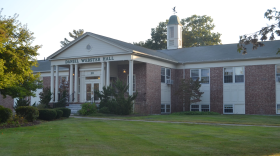About 150 people turned out at Nashua City Hall Thursday night to push back on a plan to build an asphalt plant in a neighborhood that’s also home to churches, schools, and a large immigrant community. Over four hours, they urged the city's planning board to reject the proposal out of concerns for its impact on the health and well-being of families nearby.
The plant, proposed by Newport Construction Corporation, has also drawn opposition from Nashua Mayor Jim Donchess. But it’s still pending approval from the city’s planning board, which could take months to decide.
If approved, the plant would be located about one mile from Nashua’s downtown and about 500 yards from nearby apartments. According to Census Reporter, about 30% of the neighborhood’s population is Hispanic. The median household income is $48,813, significantly lower than the median household income for Nashua as a whole.
Earlier coverage: Nashua is at a crossroads after a company proposes building an asphalt plant near downtown
At Thursday’s planning board meeting, company officials presented sound, traffic, and environmental studies in an effort to prove the plant won’t significantly impact the community's health and well-being.
Andrew Prolman, an attorney for Newport Construction Corporation, said the company has the right to build according to Nashua’s zoning ordinance. While the city has plans to revitalize the zone where the plant is now proposed, Prolman said the corporation had been in the area before the city’s master plan to revitalize the zone was presented.
“We feel we are being judged by projects and properties that may not exist in the future,” Prolman said.
Representatives from the company also presented photos to illustrate the plant’s distance from local residences.
Newport also commissioned three impact studies. According to the company, they found that the air quality surrounding the plant will align with state and federal regulations.
The company’s hired sound specialist told city officials the 250 to 300 diesel trucks that, according to the company, would be traveling through the neighborhood once the plant is in operation wouldn’t significantly increase the noise. The company’s traffic specialist said traffic would remain normal, even though about 33 trucks are expected to circulate every hour for eight hours daily, based on the company's traffic projections.
But residents are not convinced, and other advocates pushing back on Newport’s plans have recently performed studies that challenge the corporation’s results.
The Conservation Law Foundation also evaluated potential health risks associated with a drum asphalt plant based on a similar plant Newport owns in Massachusetts. At Thursday’s meeting, Amy Manzelli, an attorney with BCM Environmental and Land Law, shared the results of that study with Nashua officials.
According to the CLF study, the proposed plant location is in an area with high air toxic risks, one of the highest in New Hampshire. Mazelli said the plant would produce benzene, sulfur dioxide, lead, formaldehyde, and chromium, which can cause a variety of health problems. She said it would be impossible to evaluate the full pollution risks and potential cancer risks.
“The air pollution analysis provided by the applicant is insufficient to determine that the plant will operate safely,” she said.
At Thursday’s meeting, residents of the neighborhood where the plant would be built testified about the’s community’s livelihood and how it will be affected profoundly if the plant moves forward. Eight state lawmakers from across Nashua asked the planning board to consider the families raising their kids in the zone.
Dan Weeks, a prominent progressive activist who lives in the neighborhood, came with his three kids. He got emotional when he said that, as a father, this plant would destroy the opportunity for their children to walk around the neighborhood safely.
“We just don’t need this in our neighborhood,” he said.
About 30 people from the local Hispanic and Brazilian community also showed up for the meeting, but some left after the company’s testimony extended for two hours.
“Many have kids and families to care for; many have to work very early tomorrow,” said Heidi Trimarco, an attorney working in environmental justice programs at the Conservation Law Foundation.
Eighteen-year-old Andrea Osorio, who is originally from Colombia, was among those who stayed. She is a high school student concerned about the lives of people who don’t speak English and do not know about this project.
“I guarantee a much bigger uproar if the proposition was in a wealthier part of town,” she told the planning board.
The Conservation Law Foundation and the Granite State Organizing Project have been doing outreach to local immigrant communities to inform them about the company’s plans. They also asked the city to bring interpreters to Thursday’s meeting, but the board denied it. The organizations found their own.








